Is there any other fruit that can compare to the summery goodness of watermelon?
I mean, no summer BBQ is complete without the ceremonial watermelon cutting and inevitable sticky fingers and chins.
So while you’re enjoying this carefree treat, I just thought you should know that you’re also eating something totally healthy and nutritious.
After all, watermelon’s water content sure makes up for those salty hot dogs and mile-high burgers you ate earlier…
That’s because watermelon is actually 92% water – talk about staying hydrated! I bet this is a huge reason why watermelon is so ubiquitous during the summer when sweating in the heat causes us to become dehydrated.
You see, watermelon is related to other water-bearing fruits and veggies like cantaloupe and cucumber, but it’s also related to healthy squashes like zucchini and pumpkin. So it has the ‘best of both worlds’ kind of thing going on.
Since watermelon is so water-filled, you can also buy it as cold pressed juice or toss it in your smoothies for some extra vitamins and amino acids.
That’s right – amino acids, the essential building blocks of proteins that can’t be made by your body, but are desperately needed. You’d never think watermelon might contain those, right?
If you thought watermelon was just a tasty water replacer, think again. There’s a lot more to this melon than meets the eye.
What’s Actually Inside Watermelon?
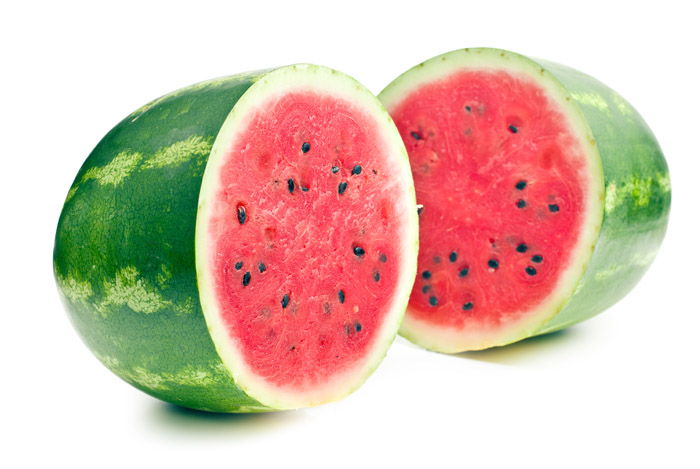 This brightly colored fruit contains a slew of vitamins, minerals, amino acids, antioxidants, and phytonutrients.
This brightly colored fruit contains a slew of vitamins, minerals, amino acids, antioxidants, and phytonutrients.
Just one cup of watermelon provides:
- 17% of vitamin A – 865 IU
- 21% of vitamin C – 12.3 mg
- 5% potassium – 170 mg
- Thiamin – 0.050 mg
- Riboflavin – 0.032 mg
- Niacin – 0.271 mg
- Vitamin B6 – 0.068 mg
- Folate – 5 ug
- Magnesium – 15 mg
- Phosphorus – 17 mg
- Zinc – 2 mg
- Copper – trace amounts
- Manganese – trace amounts
- Selenium – trace amounts
- Choline – trace amounts
- Lycopene – 6979 mcg
Hello nutrients! It’s hard to believe you get all of that for a mere 46 calories!
Watermelon isn’t as high in antioxidants as other fruits like blueberries, but it does have citrulline – an amino acid, and lycopene – the antioxidant that makes tomatoes so healthy for us.
Watermelon is King of Citrulline
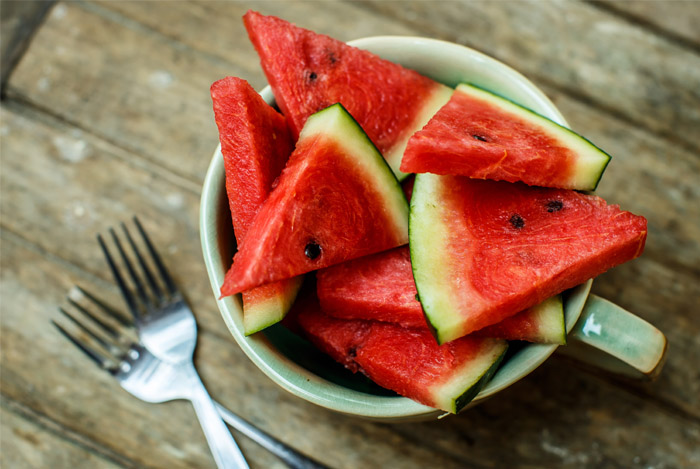 Watermelon is the absolute best source of citrulline in our diets.
Watermelon is the absolute best source of citrulline in our diets.
While you’ll find citrulline in the juicy red flesh part of the watermelon, the highest concentrations actually live in the white rind.
Which, newsflash: you can eat.
I never knew that every part of the watermelon is completely edible, not just the juicy red flesh. You can cut away the red pulp and throw the rind into a blender for a delightful smoothie addition.
This reminds me of when I learned about eating orange and banana peels…
Anyway, when our bodies digest citrulline, it gets converted into arginine, another essential amino acid. Watermelon has been shown to increase both citrulline and arginine levels in our blood so we have more to use.
“These amino acids promote blood flow, leading to cardiovascular health, improved circulation, and according to research at Texas A&M University, erectile dysfunction improvement“, which may be why it’s sometimes referred to as the Viagra of the fruit world.
Even though there’s a ton of citrulline in watermelon, we can’t rely on it as our only source of arginine. In fact, you’d have to eat 5 pounds of watermelon to get your RDI of arginine.
I love watermelon, but I don’t love that much watermelon at any one time!
Watermelon has More Lycopene than Tomatoes
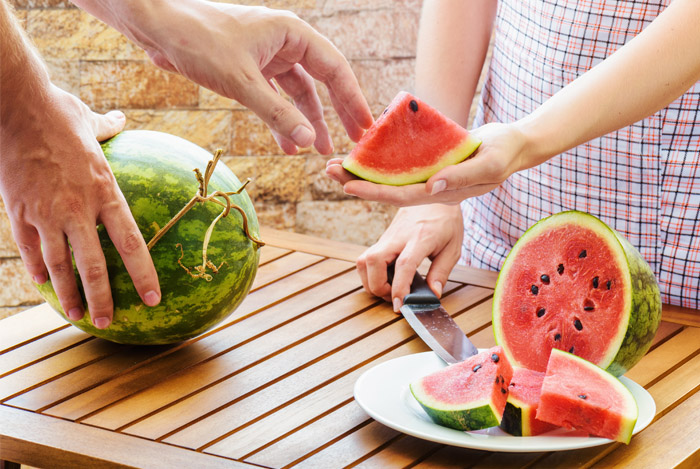 One cup of fresh watermelon has 1.5 times the amount of lycopene found in a large fresh tomato.
One cup of fresh watermelon has 1.5 times the amount of lycopene found in a large fresh tomato.
Lycopene is a phytonutrient, which means it’s a nutrient that’s naturally occurring in plants and is also beneficial to our health when eaten.
Lycopene is responsible for giving that characteristic red color to watermelon, tomato, guava, and red grapefruit. The more your watermelon ripens, the darker it will be, and the higher your lycopene concentration becomes.
Phytonutrients get our cells to function and communicate at optimal levels. When they’re working together effectively, our bodies can follow through on important enzyme reactions, leading to processes such as:
- Creating healthier tissues and organ systems
- Detoxifying foreign substances
- Strengthening the immune system
- Maintaining muscles that will perform when called upon
So what else does watermelon specifically do for our bodies?
8 Health Benefits of Watermelon
I bet you thought watermelon was all sugar and water, but I’m going to shed some light on the secret powers of this incredible fruit.
Here’s some of the best health benefits watermelon provides for our bodies.
1. Lowers Blood Pressure & Improves Heart Health
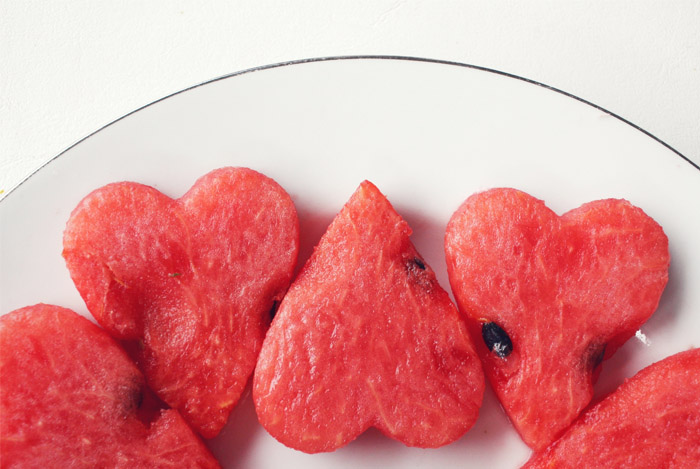 High blood pressure, or hypertension, puts millions of people at risk for heart disease, heart attack, stroke, and kidney disease.
High blood pressure, or hypertension, puts millions of people at risk for heart disease, heart attack, stroke, and kidney disease.
Citrulline and arginine both help our bodies synthesize and produce nitric oxide (NO).
NO is a gas that causes the muscles around the body’s blood vessels to relax and dilate. It also helps the arteries become more flexible, which makes it easier for blood to flow, so our blood pressure decreases.
One joint study from Purdue University and the University of Kentucky aimed to test the theory that the citrulline in watermelon could have benefits for cardiovascular health.
They split up groups of mice and fed half the group water containing 2% watermelon juice, while the other half received the same amount of water “supplemented with a solution that matched the carbohydrate content of the watermelon juice”.
After all the mice ate a diet high in cholesterol and saturated fat, researchers noticed that the mice drinking the watermelon juice had about 50% less LDL cholesterol, or bad cholesterol, and also had close to a 50% reduction in the plaque in their arteries.
On top of those amazing results, the mice on the watermelon beverage only gained 30% of the weight that the non-watermelon drinkers gained.
When researchers analyzed the levels of citrulline in both rat groups, they noticed elevated levels of the amino acid in the watermelon mice, which means their bodies were able to take full advantage of it.
Scientists believe that the citrulline in watermelon is able to lower cholesterol, decrease bad cholesterol, and even fight weight gain.
Another study published in the American Journal of Hypertension proved that watermelon extract reduced blood pressure and even hypertension in obese adults. Reducing high blood pressure decreases all those scary risks for heart disease, so this is great news indeed.
2. Combats Insulin Resistance
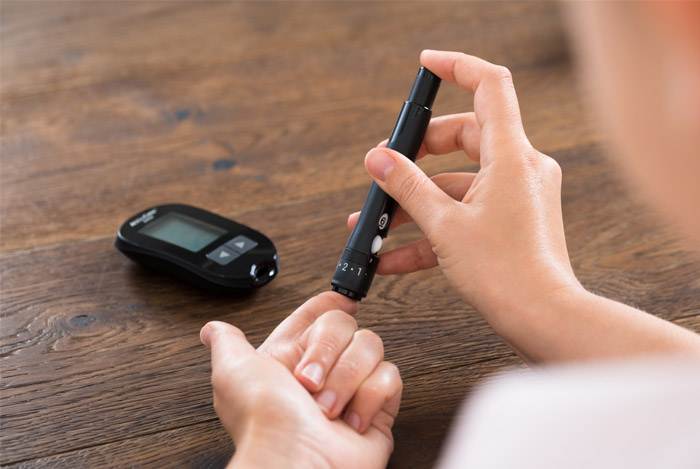 We know that our bodies need the hormone insulin to help regulate our blood sugar levels.
We know that our bodies need the hormone insulin to help regulate our blood sugar levels.
But when you become insulin resistant, like when you have type 2 diabetes, the body produces insulin, but the cells won’t do their job and become resistant to the way insulin is meant to work. Because of this, it becomes very hard to keep blood sugar levels stabilized and leads to high blood glucose levels and obesity.
However, some studies link the arginine in watermelon to decreased insulin resistance, meaning it’s easier for the body to use insulin with the help of arginine found in watermelon.
It may seem counter intuitive for diabetics to eat because it has simple sugars such as sucrose, fructose, and glucose, and has a very high GI Index coming in around 72. So I’m not suggesting that you do in fact start chowing down on it too much. But according to the research, a little bit here and there might provide some benefits.
If you’re following diabetic diet plans or a gestational diabetes diet, just make sure to count the carbs in your watermelon serving and you should be fine to enjoy it in moderation.
3. Soothes Muscle Soreness
 So you decided to up your weight resistance at the gym. Or maybe you ran that extra mile in preparation for that upcoming marathon.
So you decided to up your weight resistance at the gym. Or maybe you ran that extra mile in preparation for that upcoming marathon.
Bet your muscles are aching right about now, huh?
Well, did you know that watermelon actually helps your muscles feel better after an intense workout?
According to one study, the citrulline and arginine found in watermelon juice helped improve circulation in athletes following intense workouts. Additionally, researchers discovered that drinking watermelon juice beforehand helped to reduce muscle soreness the following day.
This is great news for people like me; I definitely feel less motivated to work out if I’m still feeling sore from the previous day’s workout.
Researchers also wanted to know if arginine and citrulline could enhance performance levels during workouts.
One study found that when arginine and citrulline were taken together, there was improved performance in untrained subjects, but not in well-trained ones.
Well, professional athletes might discount this info, but newbies to the workout scene should definitely add watermelon juice to their gym bags.
If you’re planning on taking a new class to work some underused muscles, throw some watermelon in your pre-workout smoothie to keep up with the rest of the class.
4. Fights Inflammation
 Lycopene’s an antioxidant that’s been known for it’s incredible anti-inflammatory properties and there’s a TON of it in watermelon.
Lycopene’s an antioxidant that’s been known for it’s incredible anti-inflammatory properties and there’s a TON of it in watermelon.
Inflammation doesn’t only happen when you’re suffering from arthritis. You could have systemic inflammation, which affects a lot more than your joints.
“When you’re sick, you have cellular damage, which can be caused by a variety of factors including stress, smoking, pollution, disease, and your body becomes inflamed”, Victoria Jarzabkowski, a nutritionist with the Fitness Institute of Texas at The University of Texas at Austin said to LiveScience.
Lycopene works to protect your body from cell damage and fights the free radicals that are causing it.
Watermelon also contains cucurbitacin E, a compound that reduces the activity of pain and inflammation-causing enzymes. It works to block certain enzymes just like NSAIDs like aspirin and ibuprofen.
So watermelon not only fights off the bad guys, but it tries to ease your pain until your body heals everything up. Watermelon’s a pretty swell guy.
5. Prevents Cancer
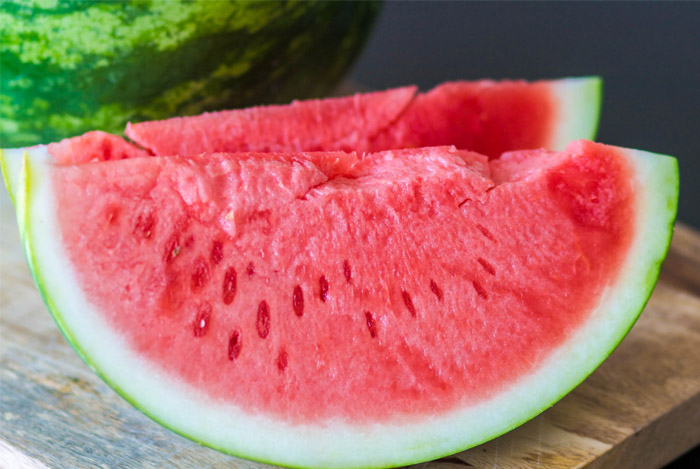 Lycopene’s free radical fighting is most important for defeating potentially cancerous cells.
Lycopene’s free radical fighting is most important for defeating potentially cancerous cells.
The National Cancer Institute says that results from several animal studies indicate that “lycopene may have chemopreventive effects for cancers of the prostate, skin, breast, lung, and liver”.
As Dr. Mercola mentions: “One study found that lycopene treatment reduced the growth of brain tumors while another showed frequent lycopene intake suppressed breast tumor growth in mice”.
While watermelon has the most concentrated form of lycopene found in food, there still haven’t been enough studies to tout concrete anticancer properties in humans yet. But the science is definitely on a promising path.
6. Hydrate with Natural Electrolytes
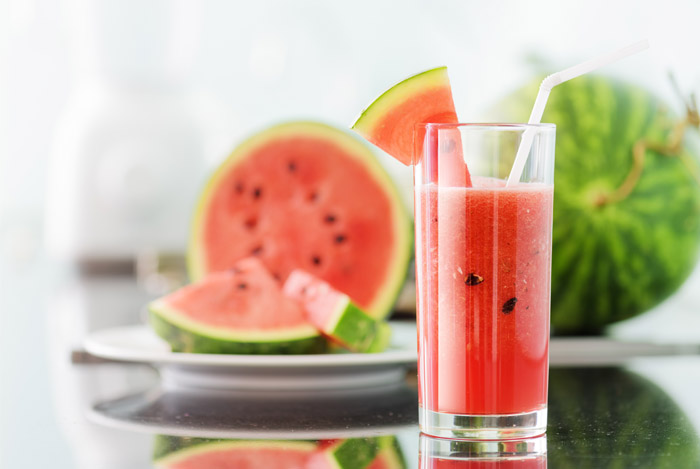
Put down that energy drink! Not only do those drinks contain way too much caffeine for your system, but there’s also a heaping amount of not-healthy-for-you sugar.
Instead, pack some watermelon slices, or juice up some cold watermelon for your water bottle to beat dehydration.
Sure, watermelon is made of 92% water, but it’s also full of important electrolytes to keep you hydrated. The best electrolyte in watermelon is potassium. It helps manage hydration levels in the body and allows oxygen to make the rounds to all the cells. It’s also important for regulating heartbeat and muscle function.
What’s worse is that an imbalance of potassium and sodium (like when you eat lots of salty foods and not enough fruits and veggies) can increase your risk for developing high blood pressure, heart disease, and even stroke.
With 5% potassium per serving, watermelon’s a quick way to load up on water and electrolytes. But potassium’s also great for your digestion.
7. Promotes Healthy Digestion and Prevents Kidney Stones
 The sugar in watermelon will give you a quick mental boost, the water will rehydrate you, and the fiber will hold you over until your next meal.
The sugar in watermelon will give you a quick mental boost, the water will rehydrate you, and the fiber will hold you over until your next meal.
“Watermelon contains dietary fiber for digestive health as well as potassium, a mineral that helps keep blood pressure capped”, says Cynthia Sass, MPH, RD, Health’s contributing nutrition editor.
But the potassium in watermelon is also really good at eliminating toxins and clearing waste from our blood. If we’re unable to clear out these toxins, it builds up in our kidneys and may lead to higher concentrations of uric acid in our blood, which may create kidney stones.
Since watermelon is a natural diuretic, it’s common to feel like you have to pee more than usual. But this is a good thing!
Every time you use the restroom, you’re eliminating waste from your body and helping out your kidneys. Watermelon is a safe and effective way to de-stress your kidneys, unlike other diuretics like coffee or weight loss pills.
8. Keeps Your Skin Looking Good
 We all know that staying hydrated is super important for healthy looking skin and hair, but did you know that vitamins A and C will also help you look your best?
We all know that staying hydrated is super important for healthy looking skin and hair, but did you know that vitamins A and C will also help you look your best?
There’s around 18% of vitamin A in just one serving of watermelon, and 21% of vitamin C.
Why are these specific vitamins so important?
Well, they help moisturize your skin and hair and build and maintain collagen, making it look smooth and supple.
“Vitamin A has a molecular structure that’s tiny enough to get into the lower layers of skin, where it finds collagen and elastin”, so it moisturizes deeply to fight fine lines and wrinkles and improve the actual texture of your skin by keeping it ultra hydrated.
Vitamin C works hand-in-hand with vitamin A by building and maintaining our collagen levels, “which provides structure to skin and hair”. Remember, 80% of our skin is collagen so we want to make sure it’s always looking great.
Foods rich in vitamin C offer protection from damaging sun rays and lighten dark skin spots. You’ll also notice faster wound healing thanks to vitamin C as well.
There’s even a bit of manganese in every cup of watermelon, which “acts as an anti-inflammatory and antioxidant, reducing swelling and infection in the skin”.
Your tanned skin will love you for eating all that watermelon this summer and you’ll be looking extra radiant.
I never gave much thought to the health benefits associated with watermelon.
Sure, I always praised it for its ability to hydrate and quench my desire for sweets, but I never knew it could lower blood pressure and even prevent kidney stones. Especially since it tastes better than junk food!
I’m glad I learned all of this so I’ll be feeling a little less guilty when I eat a ton of watermelon this summer – and I’ll definitely be juicing the healthy rinds from now on. Move over kale smoothies, it’s watermelon season!
Did you learn something about watermelon today? Do you eat watermelon rinds? Share all your watermelon-related thoughts with me in the comments!
The post 8 Refreshing Health Benefits of Watermelon appeared first on Nutrition Secrets.
http://www.nutritionsecrets.com/health-benefits-of-watermelon/
No comments:
Post a Comment